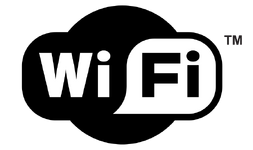Mobile Internet vs. Wi-Fi
Two different wireless technologies are widely employed to give mobile users access to the internet. On this WIKI we focus on mobile internet delivered to you by the cell phone network operators. But of course there is another way to go online: via Wi-Fi technology.
Definition

Wi-Fi (correctly written as WI-FI or Wi-Fi, but often referred as Wifi, WiFi or WIFI, which is not approved) is commonly used as a synonym for a WLAN (or wireless local area network) as it is called in some countries too. It's a trademark of the Wi-Fi alliance.
As a local area wireless technology it allows electronic devices to participate in computer networking using 2.4 GHz and new on 5 GHz frequency. Wi-Fi technology may be used to provide internet access to devices that are within the range of a wireless network that is connected to the Internet. Such an access point is also called wireless hotspot. Its coverage can comprise an area as small as a single room with walls that block radio waves, or as large as many square kilometres achieved by using multiple overlapping access points.
Here we won't get deeper into technical specifications, but examine, which technology is suited better for the needs and requirements of travellers.
Comparison: mobile internet and Wi-Fi
By their technical nature, both technologies are not better or worse per se, but have advantages and disadvantages each of their own. To put it very simple: Wi-Fi is better if you are stationary, mobile internet if you are on the move. But this generalizes things way too much, as Wi-Fi is used in buses and trains nowadays too, while you can also use mobile internet of course if you stay at a place.
Advantages of Wi-Fi
WI-FI can be great and should your preferred choice when it’s available cheap, at its best for free. This is often given out as a special service in hotels, shops, restaurants, shopping malls and many other places. You just have to log on, be online and eat as much data as you can.
When you have WI-FI for free, it’s often but not always unlimited (unlike most mobile internet). So this gives you time and data volume to download all your updates and extensive mega files for which you would have been charged high with mobile internet. To stream movies or download massive files is only recommended as long as you are on a free unlimited WI-FI.
But sometimes WI-FI is not given out for free or unlimited but especially at some hotels or resorts still for ridiculously high prices. Then you are charged for just checking your emails more than you end up paying when you buy a GB pack of a mobile internet provider. That’s where you should turn to in this case.
WI-FI is also much more universal than mobile internet. Crossing the oceans to America leads to many frequency incompatibilities of non-American GSM devices. So if you can’t connect because of this, you can still use the free WiFi at Starbucks or McDonalds.
Disadvantages of Wi-Fi
The main limitation or obstacle of Wi-Fi on your journey is simply that it doesn’t move. Running around in your hotel and spending the night at the corridor or lobby doesn’t sound like a good idea, but can be harsh reality of people looking to be in reach of the transmitter or repeater, which of course just have missed their room and cover “public areas” only.
While WI-FI can be fast, it can be only as fast as the technology on which it connects to the internet. This is often a landline ADSL-provider, but can be a slower access too. And it slows down considerably the more devices are logged on the same Wi-Fi, as – equally to tethering – all of them are sharing the same access point.
“Open” (meaning access is not protected by a password) WI-FIs are considered as very unsafe as potentially everyone can access and review your data stream. You should avoid to send sensitive information like online banking or any classified material through these access points, even if they are very easy to log on. Mobile internet protects your data better.
Nowadays, access protection by WPA2 security standard is widespread on Wi-Fis and makes it slightly safer. But you need to get the access code first from the operator to join. In some countries like Germany all WIFIs are “closed” for liability reasons and you have to register and get a password first to log on the WI-FI. For this you often need a local SIM card even at places like McDonalds for verification. So internationally you can’t always rely on having free open WI-FIs at your disposal.
Conclusions
Summing up, both technologies have their pros and cons and there is no reason why you shouldn’t use both of them if your device carries them both. You will have a replacement technology at your disposal if one of them is not working for any reason and this happens quite frequently. So mobile internet and Wi-Fi don’t always need to compete but complement one another to give you a more reliable internet connection.
This fact makes it very hard to anticipate your data needs which you will need to do if you want to buy an adequate data package for your destination. It is almost impossible to tell how much data you are going to consume on mobile internet compared to WI-FI as long as you don’t know this place very well from a previous visit. With WI-FI this is not a big deal, as you are often not charged at all. But for mobile internet, it can be quite frustrating having spend a lot of money on a pack which you just hardly use because unexpectedly you have a free WI-FI provided all the time. This is why you should prefer adjustable or expandable packages to inflexible ones and start with a small one to upsize later.
